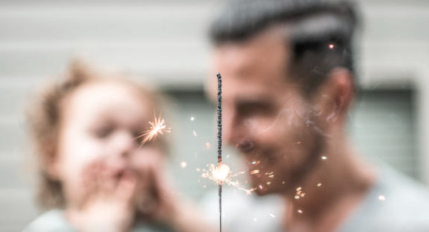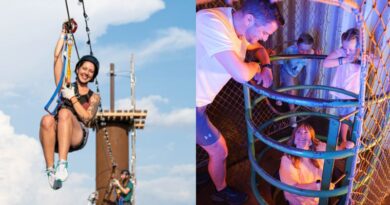True or false? Take this Fireworks Safety Quiz
Dazzling kaleidoscopes of color light up the skies over American cities and towns while whistles, pops, and booms reverberate in the air.
Celebrating the Fourth with fireworks is as American as barbecue and beer, but what’s often forgotten is that all those explosives are downright dangerous.
In 2016, according to the Consumer Products Safety Commission (CPSC), more than 11,000 people required medical treatment due to firework-related injuries. Although the number of fireworks-caused fatalities is low, injuries to skin, hands, head, and eyes are often severe and can lead to loss of limbs, blindness and lifelong scarring.
“When it comes to amateurs setting off fireworks, we have one word of advice—don’t,” said Stephanie Campbell, RN, Burn Program Manager at Parkland Health & Hospital System. “Our motto is ‘leave the shows to the pros’ and enjoy professional displays at a safe distance.”
Every year, Parkland’s ER and Regional Burn Center treat people injured by legally purchased firecrackers, sparklers, fountains, Roman candles, and bottle rockets, as well as by illegal fireworks like cherry bombs and products named M-80, M-100, and M-250, according to a recent news release.
“A surprising number of fireworks injuries are to toddlers and small children,” Campbell said. “Because their skin is more delicate, their burns can be even more devastating than those to adults. Eye injuries are another big risk to both kids and adults.”
To stay safe while you enjoy the festivities, Parkland staff encourages you to take this Fireworks Safety Quiz and share the facts with your family.
True or false?
Sparklers are safe for children.
A: False. Sparklers are the second leading cause of firework injuries requiring hospitalization and most of these injuries are to young children. Sparklers burn at a temperature high enough to melt glass or gold – more than 1,800 degrees Fahrenheit.
Homemade fireworks are safer than those you purchase.
A: False. Homemade fireworks can be even more dangerous than store-bought, statistics show. Insufficient knowledge about chemicals and explosives can lead to bad results, the CPSC states.
Only people setting off fireworks are at risk of eye injury.
A: False. Prevent Blindness estimates that bystanders receive nearly 40 percent of all firework injuries, many caused by ash, sparks, and cinders drifting into the eyes of onlookers. People setting off fireworks should wear eye goggles to protect their eyes from exploding particles.
Firework injuries most often happen to males.
A: True. Men ages 22 to 24 and boys ages 12 to 14 are the most frequently injured.
Firework injuries only happen during Fourth of July celebrations.
A: False. Firework-related injuries also happen during Labor Day, New Year’s Eve and Christmas holidays and are most common throughout the entire month of July.
Only careless adults or unsupervised children are injured by fireworks.
A: False. Even professional pyro-technicians are sometimes injured. “Fireworks are unpredictable and aren’t safe for children, even if supervised by adults. The best way to avoid injury is not to use fireworks at all,” Campbell said.
Unexploded fireworks should not be touched.
A: True. If you find any unexploded firework, contact your local police or fire department immediately. Never try to relight malfunctioning fireworks.
If you are burned while handling fireworks, rub butter or mayonnaise on your skin.
A: False. Don’t apply ointments, butter or steroidal salves to burns because they seal in the heat. The American Burn Association recommends seeking medical attention for any second-degree burn larger than 2-3 inches or a third-degree burn of any size.
Hearing loss is another potential risk of fireworks.
A: True. Hearing loss caused by the loud bang of an exploding firework can be temporary or permanent. Even bystanders who are too close when the firework detonates can suffer hearing loss.
More fireworks safety tips from Parkland Burn Center staff:
- Never use fireworks while impaired by alcohol or drugs
- Wear protective eyewear and clothing if using fireworks or standing nearby
- Never light fireworks indoors, near buildings or flammable materials like dry grass
- Soak unused fireworks in water for a few hours after discarding
- Keep a bucket of water or fire extinguisher nearby in case of fire
- In case of a burn, call 911 or seek medical attention, preferably at a specialized burn center that is experienced in evaluating and treating burn injuries.









